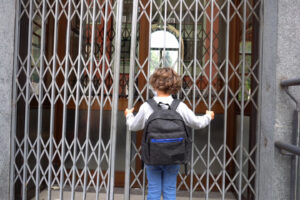Georgia mom’s arrest sparks debate on free-range parenting and government overreach
As Georgia law enforcement officers arrested Brittany Patterson in front of her children last month, they said the charges revolved around “reckless endangerment.”
“How was I…

As Georgia law enforcement officers arrested Brittany Patterson in front of her children last month, they said the charges revolved around “reckless endangerment.”
“How was I recklessly endangering my child?” the mom of four asked sheriff’s deputies, the moment caught on bodycam footage shown on Fox & Friends Weekend.
The deputies refused to answer at the time, but Patterson explained why in a hurried exchange with her son, Soren, before being taken into custody.
“They’re taking me to jail because you decided to walk down the street,” she said after officials had spotted the boy, 10 at the time, walking home alone in their small town.
Now Patterson is escalating her case, refusing to accept any plea deals and hiring a lawyer to argue she did nothing wrong, according to The New York Post.
“As parents we should have that autonomy, whether we want to wrap our kids in bubble wrap or whether we want to give our kids a little more freedom and autonomy,” she said.
“It should be our decision as parents, and not the decision of some government authority who doesn’t even know our kids or know our family.”
‘He wasn’t unsafe to begin with’
David DeLugas, Patterson’s lawyer, highlighted what he called “problematic” aspects with his client’s case during the TV interview.
“The statute she was charged with was declared unconstitutional by the Georgia Supreme Court in 1997,” he said, adding officials should also have noted the situational context.
“The irony here too is that the next day was Halloween, where kids walk often without their parents door-to-door in the dark and knock on the doors of strangers, and yet [Soren] was in the middle of the day just walking down the street not a tenth of a mile [away].”
Patterson had earlier described the street to NBC News: “It’s not a super dangerous or even dangerous-at-all stretch of road. I wasn’t terrified for him or scared for his safety.”
DeLugas also took issue with a safety plan presented to Patterson from the Georgia Division of Family and Children Services, according to The Free Press.
“Under its terms, she would correct her ‘inadequate supervision’ by downloading an app on Soren’s phone to monitor his location as a case manager stood by as a witness,” Leighton Woodhouse wrote. “Patterson must designate a ‘safety person’ to watch over the kids whenever she leaves home without them, and inform all household members any time she leaves the residence. And, with a case manager watching, she must tell Soren how important it is that he stay on the property.”
All these requirements are unnecessarily intrusive, DeLugas told journalists.
“The safety plan, it does not make him more safe, and also by the way, he wasn’t unsafe to begin with,” he said. “No other parent in the state is required to put a GPS device on their child’s phone.”
‘The culture has changed’
Patterson’s case has prompted outrage nationwide as more families experience increasing government pushback when leaving their children alone for what was once considered relatively short amounts of time.
“increasingly, parents all over the country are being punished for giving their kids a bit of leash,” Woodhouse noted, citing incidents from Michigan, Connecticut and Texas.
While childcare regulations vary by state, some commentators question whether any laws were violated in Patterson’s situation.
“Under Georgia state law, kids between the ages of 9 and 12 can be left alone for up to two hours, and Patterson had left Soren – who was just days from turning 11 – at home with his grandfather for 90 minutes,” Woodhouse wrote, noting his grandfather is disabled and lives with the family.
DeLugas further defended Patterson as she had not given Soren permission to walk to town alone.
“It’d be like if there was a law that said it was illegal to allow a child to ride a bike without a helmet, and a kid rides off by himself without a helmet. The parents didn’t do anything. Even if he did ask for permission, there’s nothing inherently criminal about giving a child permission. But that’s not even the case here.”
Patterson sees no issues with her children going unsupervised, citing examples from her own childhood.
“We were always out on four-wheelers, mopeds, dirt bikes. Many a time we would not make smart choices. We went out to the woods with tools and built forts. We climbed 80-foot trees.”
However, this style of parenting has fallen out of favor in today’s hyper-vigilant culture, said Lenore Skenazy, founder of the Let Grow nonprofit.
“The culture has changed,” she told Woodhouse. “People see an 11-year-old by himself and determine that he’s in danger, like an escaped lemur from the zoo.”
Skenazy blames the rise of cell phones and “a pervasive belief that any child alone must be in danger, and any parent who lets their child be alone must be terrible.”
“We’ve tipped over into: Don’t even let your brain work,” she said. “Just call the authorities.”
‘Parents everywhere need to be concerned’
As a result, families can face undue hardship from law enforcement over matters once deemed part of normal parenting, according to DeLugas.
“Parents everywhere need to be concerned because somebody with a uniform, a badge and a gun can go get an arrest warrant at any time for anything.”
Skenazy also points out the absurdity of government policies treating everything “like a potential emergency.”
“You can’t make laws and run society always fantasizing about worst-case scenarios,” she said, noting Patterson is just a mother “whose kid went for a walk.”
“To treat her like they caught Osama in his cave is really a break from reality.”
ParentsUSA, a nonprofit founded by DeLugas, has organized a GoFundMe fundraiser on Patterson’s behalf. As of Monday morning, it had received more than $62,000 of its $75,000 goal.
“I freely gave ParentsUSA permission to use the funds collected not only toward my legal fees but also toward the legal fees of other parents whose stories don’t make headlines and receive donations,” Patterson wrote in a Nov. 23 update. “The work they do is crucial to help defend our rights and autonomy as Parents.”



